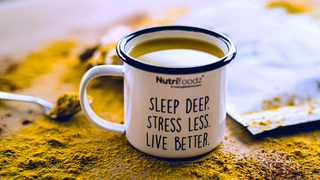What Herbalists Say About Natural Sleep Rituals for Women
You don’t need stronger willpower to fall asleep. You need a softer landing.
If you’ve ever stared at the ceiling while your mind races at 2 a.m., you’re not alone — especially as a woman. Stress, hormones, overstimulation, and the invisible weight of the mental load all stack against your rest.
We’re taught to push through. But real rest asks us to pause.
At Sippingly, we believe in sleep as a ritual — not a routine. And for many women, herbal tea is one of the gentlest and most effective ways to reclaim it.
Why Women Struggle With Sleep — and Why It’s Not Your Fault
Sleep disruption is incredibly common, especially for women in their 40s and beyond. Whether you're navigating hormonal changes, motherhood, career demands, or midlife transitions — your body may feel wired even when your mind is exhausted.
Some of the most common causes include:
- Shifting hormone levels (like drops in estrogen or progesterone)
- Chronic stress and cortisol spikes before bed
- Racing thoughts or emotional processing that starts at night
- Overstimulation from screens, noise, or environment
Your body isn’t broken. It’s asking for rhythm, not restriction. For grounding, not sedation.
What Herbalists Recommend: The Calming Power of Herbs
Certain herbs have been trusted for centuries to calm the mind, soothe the nervous system, and prepare the body for deep, natural sleep. These aren’t sedatives — they’re gentle guides, reminding your system it’s safe to let go.
Here are some of the most effective — and widely recommended — herbs for sleep, categorized by the specific support they offer:
Best for Deep, Restful Sleep
Formulated with calming botanicals like passionflower and valerian root, these blends work directly on the nervous system to reduce mental chatter and promote longer, deeper sleep.
-
Valerian Root
Earthy and powerful, valerian shortens the time it takes to fall asleep. It’s best used occasionally or in rotation with lighter herbs like chamomile or lemon balm. -
Passionflower
A calming herb that supports deep sleep by enhancing GABA activity in the brain. Passionflower is especially useful for anxiety-driven sleeplessness and helping you sink into stillness.
Best for Relaxation & Stress Relief
If stress is keeping you up, look for blends with chamomile and lemon balm. These herbs help settle the nervous system and invite a gentler mental state before bed.
-
Chamomile
A timeless favorite. Chamomile contains apigenin, a natural compound that binds to GABA receptors in the brain — reducing anxiety and encouraging restful sleep without next-day grogginess. -
Lemon Balm
Mild and citrusy, lemon balm helps reduce cortisol and calm nervous energy. It's especially helpful for those who struggle with stress-fueled insomnia or mental restlessness.
Best for Hormone Balance & Sleep Support
For many women, sleep challenges aren’t just about stress or overstimulation — they’re hormonal. Whether it’s perimenopause, postpartum changes, or the lingering effects of chronic stress, the body’s internal rhythms can easily fall out of sync.
That’s where adaptogenic herbs like ashwagandha and tulsi (holy basil) come in. These powerful plants help regulate the body’s stress response and promote a deeper, more hormone-balanced kind of rest.
-
Ashwagandha
A grounding adaptogen long used in Ayurvedic medicine, ashwagandha helps lower cortisol and support the body’s ability to adapt to stress. Especially helpful for those who feel “wired but tired,” it calms the nervous system and encourages more restorative, uninterrupted sleep. -
Tulsi (Holy Basil)
Known as the “Queen of Herbs,” tulsi offers gentle hormonal support by helping to stabilize stress hormones and ease anxiety. Naturally uplifting yet deeply calming, it’s especially supportive for emotional restlessness tied to hormonal fluctuations.
Best Caffeine-Free Nighttime Teas
Teas made with rooibos, lavender, or other naturally caffeine-free herbs are ideal for building a nightly ritual — especially for sensitive sleepers.
-
Lavender
Soothing in scent and flavor, lavender gently slows the heart rate and relaxes the body. It’s often blended with other herbs for a deeply restorative experience. -
Rooibos
A red bush tea from South Africa, rooibos is naturally caffeine-free and rich in antioxidants. Offers a smooth, earthy base perfect for bedtime sipping.
But what makes herbal sleep teas truly effective — and deeply enjoyable — is the way they’re blended. Herbalists often combine calming herbs not only for layered flavor but for enhanced synergy. When used together, these herbs complement each other — balancing potency, taste, and effect in every sip.
The right sleep tea isn’t built around a single herb — it’s a thoughtful combination of plants working in harmony to support both body and mind.
🛍️ Explore our full Sleep Tea Collection and find the blend that speaks to you.
When and How to Sip for Deeper Rest
Drinking the right herbal tea is just the beginning — it’s the ritual that makes the difference.
Try this wind-down flow each night:
- Steep your tea 30–60 minutes before bed
- Dim the lights and lower background noise
- Put your phone away for at least 15 minutes
- Pair your tea with a grounding habit — journaling, stretching, or simply deep breathing
- Sip slowly, without multitasking — this is your moment
Your nervous system learns from consistency. The more loving and intentional your evening ritual becomes, the more your body will respond in kind.
Ritual Over Routine
A routine is something you check off.
A ritual is something you return to.
Your bedtime tea isn’t just a drink. It’s a signal. A return to yourself.
And in a world that demands so much, this may be your only invitation to rest — without apology.
Ready to Start Your Ritual?
We’ve curated a calming collection of sleep-supporting teas from herbalists and wellness tea makers around the world.

Try Our Sleep Tea Discovery Box
- 10 unique blends
- 4 tea bags of each
- Herbalist-approved
- No subscription, no pressure
- Just better sleep, one cup at a time
🛍️ → Shop the Sleep Tea Discovery Box
Common Questions About Sleep Tea
Q: Can tea really help you fall asleep?
A: Yes. Herbal teas like chamomile, valerian, lemon balm, and passionflower gently support your nervous system, helping the body relax into sleep.
Q: What’s the best time to drink sleep tea?
A: About 30 to 60 minutes before bed is ideal. It gives your body time to absorb the calming effects while transitioning into a wind-down state.
Q: Will herbal tea make me groggy in the morning?
A: Not typically. Unlike melatonin or sleep meds, most sleep-supporting herbs work gently and won’t leave you with that heavy, sluggish feeling the next day.
Q: Can I drink sleep tea every night?
A: Yes! Most calming teas are safe for daily use. Many people rotate herbs or blends to suit how their body feels. Always consult your healthcare provider if you have specific health concerns.
Sip slowly. Sleep deeply. Wake restored.
Your rest is worth protecting.


